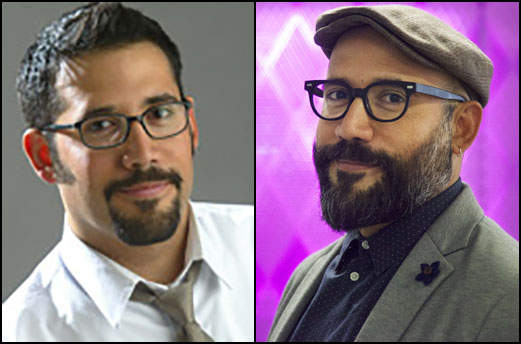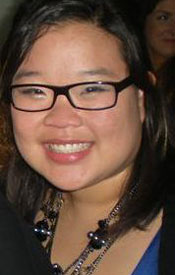The National Association of Hispanic Journalists’ (NAHJ) conference is about a week away and among the numerous activities is the Board of Directors election.
I’ve had the privilege to serve on the board for about three years, and, as I look over the candidates, I know the organization is in good hands.
Here are my thoughts on the candidates and endorsements… well, endorsements on some of the races.
:: At-Large Officer, Online
This race is first because it’s the position I am leaving behind.
I’ve had the honor of knowing and working with both the candidates for some time. Each brings a great deal of experiences to the board… but for me there is one clear choice.
Hiram Enriquez is also a model Web journalist. This guy is the real deal, with experiences working with CNN, Yahoo! and now Univision. He’s one of the forces behind the excellent panels and workshops we’ve offered at the convention in recent years.
Patricio Espinoza is the model of a hyperlocal journalist struggling to make it with his several sites, including AlamoCityTimes.com. He has served on the board as the At-Large Officer, Spanish Language.
For me, I have to admit that I have been deeply disappointed with the tone of his campaign. Let’s hope it’s in the past.

Who gets my vote: Hiram Enriquez
Why: He is converged in multiple ways. Bilingual, hard-working, well-connected, seasoned Web journalist. We’re lucky he’s a candidate for our board… I know he is being recruited by others.
:: President
For the presidential race, I’ve known these two amazing journalists for years and think they are fantastic candidates. Let me get this out of the way… I’m undecided on who I endorse.
Hugo Balta has been on the board as long as I have, I believe. A victim of the hostile time in our industry, getting laid off, but someone who won’t give up on journalism or the importance of our organization.
There are some topics, and sometimes approaches, that I don’t necessarily agree with, but this guy’s a fighter… and he’s thoughtful when he speaks. He’s going to fight for you and the organization.
Michele Salcedo is a journalism and NAHJ veteran. She too has gone through layoffs and has stuck it out in this downright volatile time, most recently becoming an editor The Associated Press.
I have to admit, I had a concern based on a comment she made about wanting to change people for access to our tweets. But, we talked about it… like many journo veterans, she is protective of our content and wants to ensure we have a stronger footing then where we are.
She’s served in pretty much every role NAHJ has to offer, so she knows our organization. She’s going to get things done.

Who gets my vote: [UNDECIDED]
Why: They are two great candidates!
:: Vice President, Broadcast
I’ve known both of these candidates for a few years, serving on the Board with Manny this past year. I’ve seen their engagement with the organization and both bring valuable experiences to this position.
Manuel De La Rosa, reporter at KII-TV (Corpus Christi, TX), is a hard worker, USC alum and die-hard L.A. fan. He’s served his region well, most recently organizing a conference there.
Mekahlo Medina, anchor/reporter at KNBC-TV NBC 4 News Raw, to me represents the future of broadcast. He’s on the cutting edge and has shared those skills with our student projects. Did you see the promo he made – unsolicited – for last year’s conference? Awesome.

Who gets my vote: Mekahlo Medina
Why: The student projects have a special place in my heart. I co-ran the online one for six years. I know the passion and commitment it takes. If you do that leadership role, you earn a spot on the board in my book. Plus, like I said, this guy is the future.
:: Vice President, Print
Gustavo Reveles Acosta, board member and reporter at El Paso Times, would get my vote even if he weren’t running unopposed. This guy cares. This guy works hard. This guy is a hilarious and wonderful person. We’re so lucky he has served and will serve on our board.

Who gets my vote: Gustavo “Goose” Reveles Acosta
Why: He’s brilliant! Thank him for his serve when you see him at the convention.
:: Financial Officer
Russell Contreras, reporter for The Associated Press, is also someone who would get my vote even is he weren’t running unopposed. I’ve had the pleasure of knowing Russell for years and consider him a friend and Web journalism colleague.
Loved his 80s references in the video he made, but don’t agree with the perceived CCNMA beef he invoked. Those are old wounds we don’t need to reopen.
In these tough financial times, this is perhaps one of the most important positions on the board… and I’m glad someone like Russell is going to take on those responsibilities.

Who gets my vote: Russell Contreras
Why: I’ve admired his work and commitment to the organization for years. Plus, he included Ah-Ha in his video ad.
:: Secretary
Erin Ailworth, staff writer for The Boston Globe, is someone I hope to work closer with in the future. I don’t know her well, but am sure she’ll be a good addition to the board.
:: At-Large Officer, General
Rebecca Aguilar, a freelancer based in Dallas, is someone I’ve kept my eye on for sometime. She won Broadcast Journalist of the Year Award in 2007. She most recently has dove head first into blogging and multimedia.
J. Israel Balderas, a freelancer in Washington D.C., I don’t know much about. I’m sure he is a solid candidate and will serve the board well.

Who gets my vote: Rebecca Aguilar
Why: To me, she represents my vision of this position… someone who represents so many of our membership. Broadcast, freelance, laid off and experimenting on Web.
:: At-Large Officer, Spanish Language
Ada Alvarez, a freelancer in Washington D.C., is a force. If you have not gotten one of her emails or seen her work, let me tell you she works hard… non-stop… driven by passion. She previously served as the student representative.

Who gets my vote: Ada Alvarez
Why: She’s driven and passionate. I get more emails from her about NAHJ, than NAHJ. I think that’s a good thing.
:: Student Representative
Jose Antonio Acevedo, Universidad De Puerto Rico; Jacqueline Guzman, California State University, Northridge; Alejandra Matos, University of Texas El Paso.
I am note eligible to vote in this race and honestly don’t know the candidates… so, like completing my March Madness bracket, I’ll back someone for some random reason. I have a special place in my heart for CSUN. I grew up about a block away and my mom worked in the food court when I was in college.
:: Proposed bylaw changes
Should the bylaws of the National Association of Hispanic Journalists be amended to upgrade the position of At-Large Officer for New media to Vice President for Online?
My vote: HELLS YES! (Although it should be called Digital or Web instead of New Media)
Should the bylaws of the National Association of Hispanic Journalists be amended to expand the Board of Directors to include an Academic Officer At-Large?
My vote: Yes
Should the bylaws of the National Association of Hispanic Journalists be amended to give the Student Representative on the Board of Directors the right to vote?
My vote: Yes
Whether you agree with my choices or not, please go vote!
Help shape the leadership that will guide NAHJ through these incredibly difficult times. The polls are open up until the end of the convention.
Click here to access Election Logon Screen
 So much has changed in my career since I served. In all honesty, I feel like I was a kid when I was first on the board, trying to normalize the digital’s role in journalism just over 10 years ago. That sounds crazy, but that was the struggle for journalists working online.
So much has changed in my career since I served. In all honesty, I feel like I was a kid when I was first on the board, trying to normalize the digital’s role in journalism just over 10 years ago. That sounds crazy, but that was the struggle for journalists working online.








